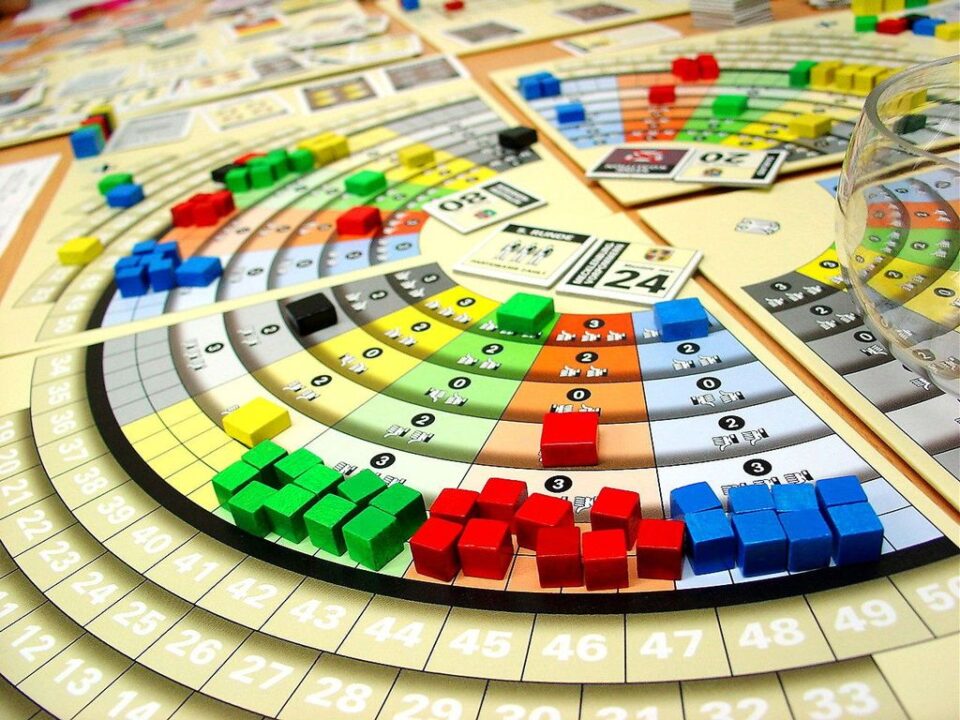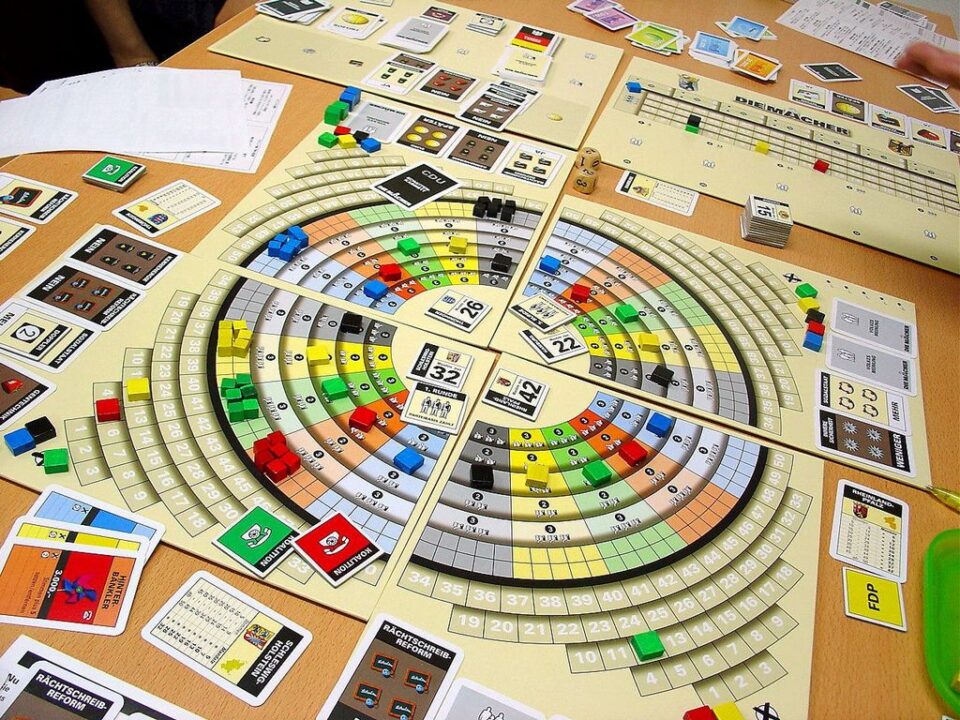Overview
Welcome board game enthusiasts to my deep-dive review of Die Macher, a game that sets out to brilliantly simulate the drama and complexity of German politics. This critically-acclaimed political board game from designer Karl-Heinz Schmiel marries strategic depth with thematic representation, all while fostering rich player interaction. In playing Die Macher, my sessions have unraveled into epic tales of alliance and backstabbing, where each decision is a ripple in the pond of collective intrigue. As we journey into the core of this sophisticated political battlefield, let’s unpack how this game not only challenges your strategic foresight but also vividly immerses you within a world where every move you make can either boisterously rally your party or lead to your demise.
How It Plays
Setting Up
In Die Macher, set up begins with preparation of the game board, representing various German regional elections. Players receive party bases, along a personal supply of markers, cards, and money to manage their political campaigns. Each round’s featured election seat is prepped, creating a unique starting point per game.
Gameplay
Players vie for influence within seven elections. A turn in Die Macher sees you performing actions such as polling, party meetings, media control, and policy change, all aimed at aligning your party’s platform with public opinion and winning electorate hearts. The game masterfully melds auctioning, resource management and strategy planning over a span of two to three tense hours.
Winning the Game
Victory in Die Macher comes down to the skilled amassing of election points, policy points, and party membership levels throughout the elections. The winning condition elegantly combines long-term strategizing and adaptability, culminating in a nerve-racking finale where every decision you’ve made comes into play to reveal the most successful political party leader.
Want to know more? Read our extensive strategy guide for Die Macher.
Unraveling Strategic Intricacies
In Die Macher Review, one can’t help but delve into the Strategic Depth and Complexity that serves as the backbone of the game’s brilliance. Often, I find myself reminiscing about those nail-biting sessions where victory was a close call. The strategy implements a mind-bending dance between short-term objectives and the long-game plan, always keeping me on my toes.
Decision-Making Mastery Transitioning adeptly, every choice parallels real-world political strategy. The complexity isn’t just for show; it’s about demonstrating your adaptability to the ever-changing political landscape. Just last week, we had a moment where a cunning move shifted the power dynamics drastically. Such moments underline the necessity of dynamic strategic thinking in Die Macher.
Steering ever so smoothly, but enough of strategies, let’s pivot to the thrills of Political Theme Integration.

Bringing Politics to the Tabletop
Discussing Die Macher in a recent game night, the seamless marriage of mechanics and the intricacies of German politics left us in awe. As we navigated the nuanced party landscape, shaping public opinion and jostling in the Bundestag felt engagingly authentic.
Real-world Resonance
The game’s ingenious system of issue cards and media influence drew parallels to our own electoral experiences. It prompted not only strategies but also debates on real political strategies and ethics, blurring the lines between the board and real-life implications.
A Detailed Depiction
The electoral districts’ diversity in Die Macher turns each game into a narrative trek through an elaborate campaign. Stay tuned as next time we’ll dissect how player interactions elevate the entire experience in ‘The Dance of Democracies’.

The Pulse of Player Engagement
Within the framework of my Die Macher reviews, there has always been a drawn emphasis to how players spark off each other. Take it from me—a shy gamer transformed. After a few rounds, I was wheeling and dealing coalitions as if at a real political convention.
Relishing Rivalries
During one memorable game night, the sheer delight as my soft-spoken friend called a snap election; a stroke of strategy that upended our laid-back gameplay into a cutthroat battle of wits. It personified the tense undercurrent running through every decision and alliance in Die Macher.
Collaborative Choices
I’ve observed that this game masterfully interweaves collaboration with competition. Deliberating over policies requires a healthy dose of intraparty negotiation that fuels the game’s social dynamo. These carefully crafted player dynamics truly animate Die Macher.
Given this engaging interplay, I resoundingly endorse Die Macher for its rich player interaction dynamics.
Conclusion
Wrapping up this review of Die Macher, it’s clear that the strategic depth, intricate political theme, and lively player interaction weave together to create a supremely engaging experience. This isn’t your run-of-the-mill board game; it appeals to the tactician, the diplomat, and the social butterfly within us all. It’s a well-oiled machine that challenges the mind and stirs the competitive spirit. After countless playthroughs that have led to both triumphs and humbling defeats, Die Macher has repeatedly proven to be a game with staying power on my shelf, prompting animated discussions and bringing people back for more. The balanced amalgamation of gameplay mechanics and social dynamics undoubtedly makes Die Macher a worthwhile addition to any serious gamer’s collection.


